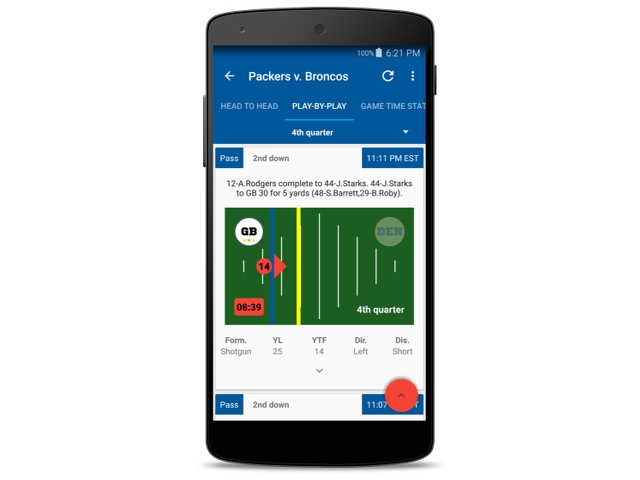Elisha Ferrara has no qualms about calling himself an opportunist.
A football fan, he expected that the official app of the NFL—which currently has 50 million downloads—to be top-notch. Instead, Ferrara said that the app constantly crashes, people complain that it’s off by one point, and doesn’t even provide a box score, which is basic in most sports scoring apps. “We can make something better in a couple of months, and we can make it easy to use,” thought Ferrara.
“We got a lot of users really quickly and people were asking us if the app could help them with their fantasy football picks.”
Ferrara is the co-founder of OnPoint, a mobile app that his team, currently based in Communitech, promises will provide access to thousands of NFL live stats in an easy-to-use platform. Using an API from Sportradar, an American-based company also used by Google, OnPoint said that they can deliver data at the quickest speeds on the market—even faster than broadcasters on live TV, Ferrara said.
“It’s so much more than 1,000 stats, because if I tell you that it’s that much, people are like ‘who cares’?” said Ferrara. “But we actually crunch those numbers and we can look at interesting trends and player performance.”
The app allows users to have an clear overall look at which teams are doing best defensively or statistically. Ferrara said that most scoring apps scrape data from ESPN and end up getting “sued into the ground,” so his team wanted to make sure it designed the software correctly. Ferrara admits that this has been a challenge as they try to find resources to do this properly.

“It’s tricky because investors in Canada want to see your product launched, they want to see revenue, and you need to show them you have a website,” said Ferrara. “But we thought, we can’t launch unless we have seed money. So we made a prototype and we were able to demonstrate that we were able to deliver more data at the quickest speeds on the market, and we got multiple offers pretty quickly.” So far, the company has raised about $85,000 in seed money, which has covered their licensing and server costs.
Part of the reason why Ferrara said the company could demonstrate scale is that 20 percent of its users are in California, while the second and third biggest are Texas and Florida, respectively. “Our average user is on the app multiple times a day, and they spend an average of 40 seconds on it,” Ferrara said.
One of the most popular features of the app is its fantasy football feature, called head-to-head. Users can pick two players and, side-by-side, compare how they’ve competed historically against the defensive lines of the teams that they’ll be facing next week. The data is clearly represented through line graphs. “We got a lot of users really quickly and people were asking us if the app could help them with their fantasy football picks,” said Ferrara. “We’ve actually projected how many running yards a certain running back will get, versus say, the Miami Dolphins defensive line if it’s raining and they’re playing on turf. A lot of variables go into it.”
As for improving their product, the company hopes to eventually integrate IBM Watson into its product, are currently working on an iOS app, and are hoping to make an MLB version. “A lot of sports apps use the same source as us, so they’re getting the data at the same time, but they have so much bloatware,” said Ferrara. “We were just tired of using ESPN and CBS because they aren’t mobile companies. They hire third party companies to build a sports app, and then they never fix it.”
Feature image courtesy NFL.com.


